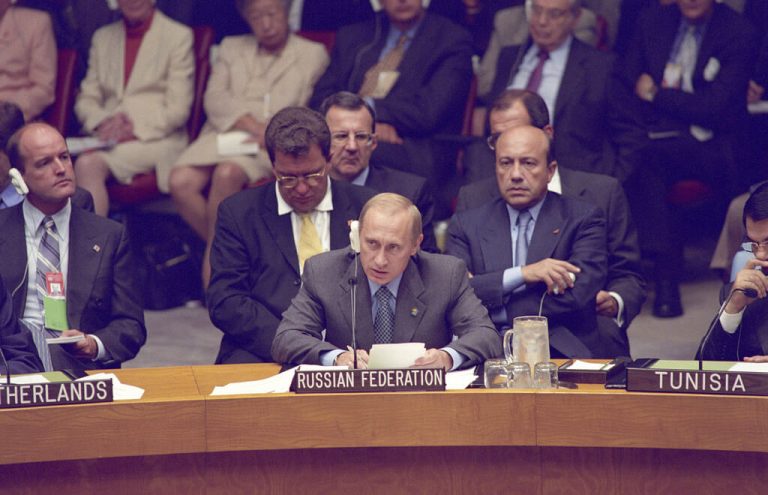
News About Sheynnis Palacios Not Covered by Media Operating in Nicaragua

PUBLICIDAD 1M
PUBLICIDAD 4D
PUBLICIDAD 5D
Putin may not be a grand strategist, and he certainly wouldn’t mind a buffoon in the White House; but he knows an overly risky bet when he sees one

United Nations | Flickr.com | Creative Commons
Moscow – Email scandals have plagued Hillary Clinton, the Democratic Party nominee for US president, throughout her campaign. First, there was the revelation that Clinton, as Secretary of State, had used a private server for official business, resulting in an FBI investigation that chastised her for being “extremely careless.” Now hackers, believed by the US to be working for or on behalf of the Russian state, are thought to be the source for Wikileaks’ publication of a slew of Democratic National Committee emails revealing DNC leaders’ support for Clinton during the primaries. Russian hackers are also suspected of intruding upon the Clinton campaign’s servers.
Clinton’s opponent in the Democratic primary, Senator Bernie Sanders, dismissed the brouhaha about her private server early in the campaign. But Clinton’s opponent in November’s election, Republican nominee Donald Trump, has embraced the hackers’ effort to discredit Clinton – just as he has, it seems, embraced the country responsible for the hacks. The question is whether Russian President Vladimir Putin is, as suspected, actually working to derail Clinton’s campaign and get Trump elected.
The two men’s international bromance is well known. Trump has complimented Putin’s leadership frequently, and has been complimented in return. He has also expressed an interest in building deeper ties with the Kremlin, and said that he would consider accepting Russia’s annexation of Crimea and lifting the sanctions that were imposed in response – all without asking Putin for anything in return.
Perhaps most unsettling, Trump has called into question America’s automatic defense of NATO allies such as the ex-Soviet Baltic states, whose independence Putin has questioned. When Newt Gingrich, one of Trump’s foreign-policy gurus, called Estonia “the suburbs of Saint Petersburg,” he implied that Putin could have free rein with Russia’s neighbors.
Then there is Trump’s unabashedly pro-Russia team of advisers. His campaign manager, Paul Manafort, was a key figure in the repackaging of Viktor Yanukovych, Putin’s proxy in Ukraine, into a faux democrat for the 2010 presidential election. Since Yanukovych’s ouster in 2014, Manafort has helped revive the fortunes of his client’s corrupt Party of Regions, positioning it as the main opposition to Ukraine’s current government. Likewise, Trump’s main foreign-policy adviser, Carter Page, an investment banker, has worked closely with Gazprom, the natural-resources behemoth that is a virtual arm of Russia’s government.
Both Page and Manafort have made fortunes in Russia – Manafort ran an investment fund that specialized in investing Russian oligarch money in Ukraine – and no doubt dreams of even bigger possibilities if Trump is elected. There is even speculation (though no solid evidence) that Trump himself has business dealings with Russia, beyond his well-documented courting of Moscow politicians to let him erect a Trump Tower near Red Square.
Given these connections, it would be surprising if Putin did not see a Trump victory as advantageous for Russia. And perhaps the biggest benefit would be the defeat of Clinton, whom Putin has plenty of reason to dislike.
As Secretary of State, Clinton repeatedly took Putin to task for his clampdown on Russian protesters and independent Russian media, and rebuked him especially harshly for Russia’s meddling in Ukraine. Add to that Putin’s “traditional” attitude toward women (another source of affinity with Trump), and it seems reasonable that he would prefer to deal with just about anyone other than Clinton. The fact that the alternative is a man who seems genuinely to admire him is icing on the cake.
Or so it seems. The truth may be completely different. Russia is widely viewed in the US as an unscrupulous, even malevolent power. Russia’s links to the DNC and Clinton campaign hacks, regardless of one’s feelings about the information revealed, have reinforced this perception, which is not entirely off base. After all, Putin, a former KGB officer, has proved more than willing to use digital (not to mention physical) means to harass, intimidate, and coerce his enemies and opponents.
Of course, Russia is not alone. The US has engaged in its fair share of spying, exemplified by the National Security Agency’s surveillance programs that came to light in 2013. And it has not hesitated to meddle in other countries’ affairs. Consider the leaked 2014 phone call between Clinton’s assistant secretary of state, Victoria Nuland, and the US ambassador to Ukraine, Geoffrey Pyatt, about how to ensure a pro-Western outcome to the popular protests that led to Yanukovych’s fall from power.
Nonetheless, given Russia’s poor reputation in the US, the latest email scandals may well hurt Clinton less than they hurt Trump – whose subsequent appeal to Russia to find 30,000 emails missing from Clinton’s tenure at the State Department has not done him any favors. Putin probably recognizes this.
This is not to say that the Kremlin was displeased by the hack, which, at least in the case of the DNC, may have been carried out by Putin supporters, not official contractors. But it is likely to have been more of a petty prank than a genuine effort to undermine Clinton’s campaign.
It could have been payback for the recent NATO meeting in Warsaw, where Russia’s aggression was at the top of the agenda, or even for the handling of the doping scandal that nearly kept Russia out of the Rio Olympic Games. It could even have been retaliation against Clinton for a direct insult; she did, after all, once liken Putin’s moves in Ukraine to Hitler’s actions prior to World War II – an affront not just to Putin, but also to a Russia that prides itself on its role in defeating Nazism.
But, bad blood aside, Putin may still consider Clinton the better choice. She might be against him, but she is a known quantity, with a foreign policy that Russia – an old hand at adversarial relations – could manage. With Trump, no one – possibly not even Trump – would know what to expect. Putin may not be a grand strategist, and he certainly wouldn’t mind a buffoon in the White House; but he knows an overly risky bet when he sees one.
Nina L. Khrushcheva is Professor of International Affairs and Associate Dean for Academic Affairs at The New School and a senior fellow at the World Policy Institute.
Copyright: Project Syndicate, 2016.
www.project-syndicate.org
Archivado como:
PUBLICIDAD 3M
PUBLICIDAD 3D